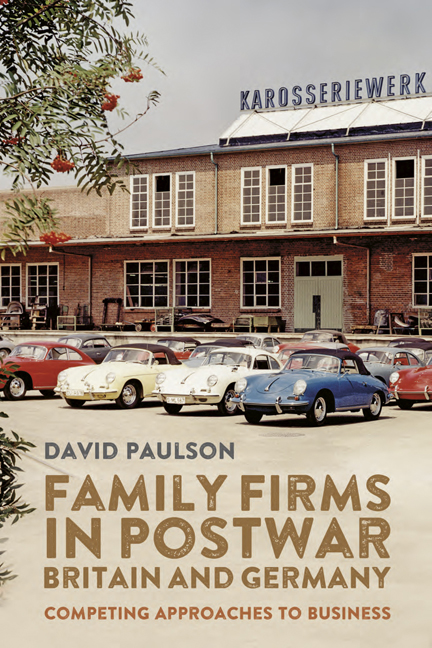Prologue
Published online by Cambridge University Press: 10 January 2024
Summary
As they began to rebuild their businesses after the Second World War, company owners and managers in the West Midlands and Baden-Württemberg faced multiple challenges. Some were close to home and personal: how to manage the relationship between family and family firm, how to plan for succession, how personal values would impact the conduct of company affairs, whether one's standing within the local community would boost business – or vice versa. Other challenges depended on what we might call the external ecosystem and were consequently harder to control: how to find the most capable staff, how to fund a growing – or struggling – business, whether it was located in the most appropriate place for business success. In Part One we consider these challenges in relation to the companies examined in the following case studies, to help us understand one fundamental question: which mattered more for business success, the ability of individual entrepreneurs, or the advantages of the ecosystem in which they conducted their business? We begin with a brief overview of each region's situation at the beginning of our period.
Post-war Circumstances
Both countries faced extraordinarily challenging conditions after the end of the war in 1945. Britain had suffered 358,950 war dead, 63,635 of them civilians. Some 75,000 shops, 42,000 commercial properties, 25,000 factories and 450,000 homes had been destroyed or made unusable by German bombing. Material and labour shortages constrained rebuilding efforts, and Government policies focused less on local needs than on external challenges such as ongoing military commitments and the generation of income from exports, all made more difficult by the “almost indecent swiftness” with which the American Government ceased its Lend-Lease financial support programme at the war's end. Ministers believed they could plan the country's way out of its economic difficulties, failing to respond to the public's desire for more material goods and fewer restrictions; wide-ranging restrictions on consumption were still in place in 1951. Business leaders were frustrated throughout the late 1940s and 1950s by Government demand-management policies, the manifestation of the difficulty of achieving both sustainable domestic growth and external stability during the Cold War.
- Type
- Chapter
- Information
- Family Firms in Postwar Britain and GermanyCompeting Approaches to Business, pp. 21 - 27Publisher: Boydell & BrewerPrint publication year: 2023



